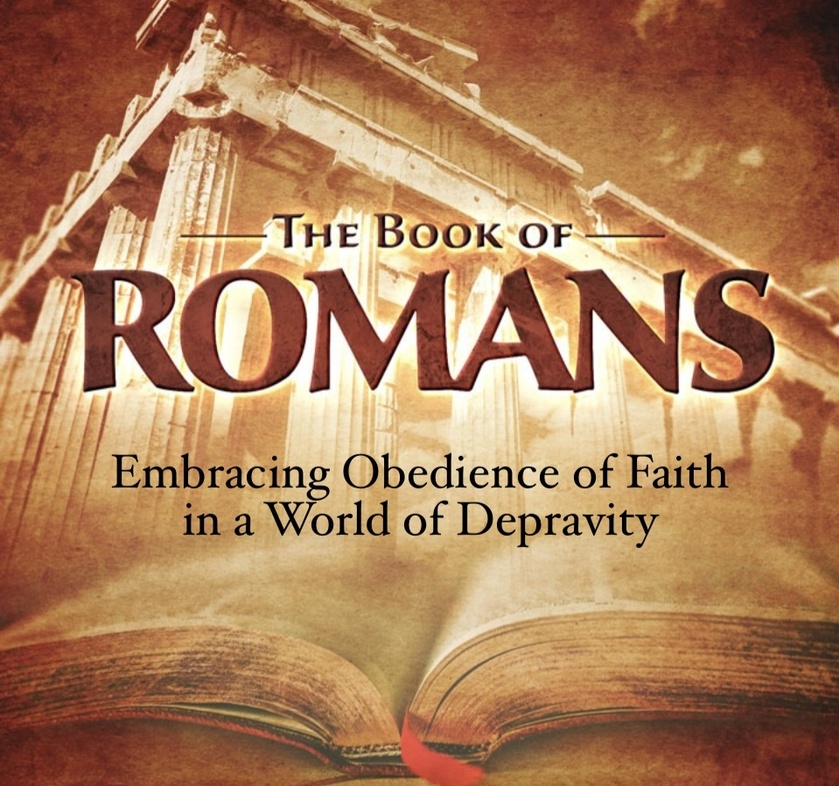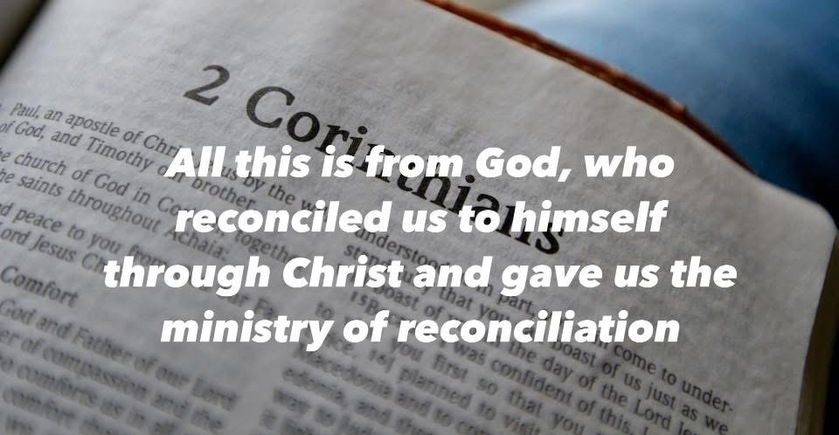Set Apart for the Gospel: Embracing Obedience of Faith in a World of Depravity
Romans 1:1-7
"Paul, a servant of Christ Jesus, called to be an apostle, set apart for the gospel of God, which he promised beforehand through his prophets in the holy Scriptures, concerning his Son, who was descended from David according to the flesh and was declared to be the Son of God in power according to the Spirit of holiness by his resurrection from the dead, Jesus Christ our Lord, through whom we have received grace and apostleship to bring about the obedience of faith for the sake of his name among all the nations, including you who are called to belong to Jesus Christ,
To all those in Rome who are loved by God and called to be saints:
Grace to you and peace from God our Father and the Lord Jesus Christ."
Well we've finally arrived at the long anticipated "book of Romans", and diving right in, what strikes me as interesting is the Apostle Paul is making the case for Christ, but also for his missionary work. Romans chapter one in fact wastes no time getting into the weeds of social depravity and ungodlines. In fact Paul tells us he is set apart to do battle with exactly that.
Through Jesus, Paul received
"grace and apostleship to bring about the obedience of faith for the sake of his name among all the nations."
This isn’t just personal salvation; it’s a global call to obedience rooted in faith, extending to Gentiles (non-Jews) like the Romans, and even us today.
What is the obedience of faith?
Sometimes translated as "obedience that comes from faith", appears in Romans 1:5, where Paul describes his apostolic mission. Biblically, this concept ties faith and works together without confusing them. Faith is the root, and obedience is the fruit. Though differentbin their purpose, they are together one plant. For instance, refusing to believe in Christ is seen as disobedience to the gospel, while true belief empowers believers to live out God’s will through grace.
So, it's talking about submission and Christian action that flows naturally from genuine faith in Jesus Christ, rather than a rigid adherence to man's traditional rules as a means of earning that salvation. In practical terms, for a believer in any age and from any class or group, it means that saving faith isn’t a mere intellectual assent, but it leads to real change in things like loving others, pursuing holiness, and sharing the gospel, all enabled by God’s grace, not sourced in human effort.
So, "Christian action" refers to the practical outworking of one’s faith in Jesus Christ through deeds that reflect His teachings and character. It’s not merely good works or social activism for its own sake, but actions rooted in a personal relationship with Christ, motivated by grace, love, and obedience to God’s will rather than legalism or especially not having to do with self-promotion. Probably the best example of this is found in Matthew 25:31-46, often called the Parable of the Sheep and the Goats, which provides a vivid outline of Christian action, portraying it as compassionate, practical service to those in need as an expression of one’s relationship with Christ. The criterion isn’t abstract beliefs or rituals but concrete actions: feeding the hungry, giving drink to the thirsty, welcoming strangers, clothing the naked, caring for the sick, and visiting the imprisoned. Jesus emphasizes that such deeds, when done to "the least of these my brothers," are done to Him personally, making Christian action inherently relational and Christ-centered.
In essence, Paul's mission is sharing the gospel and encouraging greater faith which forms the foundation, while the resulting "obedience of faith" (Romans 1:5) manifests as active obedience, where faith "worketh" through love and good works (as Paul echoes in Galatians 5:6 and elsewhere).
Galatians 5:6
"For in Christ Jesus neither circumcision nor uncircumcision counts for anything, but only faith working through love."
He's saying, your religious systems count for nothing in comparison to living your faith in Christ.
So, Christian action is "faith working through love".
And all that said, there's much more than promoting faith and a loving reflection of Christ in the community at play here. Paul desires to be in Rome to bring good theological guidance into the new emerging church there. They were always in his prayers, and he's longed for quite a long while to impart spiritual gifts to them, to strengthen their church.
And so, Paul wastes no time going into the theological challenges that faced them; the wrath of God, unrighteousness that suppresses the truth, futile thinking, sexual immorality, and dark foolish idolatrous minds.
Paul transitions seamlessly from his apostolic introduction and the power of the gospel into a stark confrontation with humanity’s universal predicament. I suppose you could say that Paul, before unpacking the good news of righteousness by faith, realizes he must first expose the bad news of human rebellion against God, which suppresses truth and spirals into depravity. Paul's intent is to come at them with the transformative truth that counters ungodliness and restores obedience through faith.
In verses 1-17, Paul establishes the gospel as God’s power for salvation to everyone who believes, Jew and Gentile alike (v. 16), revealing a righteousness from God by faith. But to appreciate this gift, we need to see the depth of the problem it solves. Here, "ungodliness" refers to irreverence toward God (like idolatry), while "unrighteousness" involves injustice toward others, two sides of the same sinful coin. Paul argues that humanity isn’t ignorant of God; rather, we’ve actively suppressed evident truths about Him through creation (vs.19-20), leading to futile thinking and darkened hearts (v. 21). This suppression of truth isn’t passive or accidental, it’s a willful exchange; trading God’s glory for idols (vs. 22-23), which God responds to by "giving them up" to their own desires (vs. 24, 26, 28).
The result?
A cascade of moral and social decay, including dishonoring their bodies through impurity (likely including sexual immorality), same-sex relations (homosexuality) as an example of these unnatural sexual desires and exchanges (vs. 26-27), and a broader list of other vices like envy, murder, deceit, gossips, slanderers, atheism, insolence and malice toward God (vs. 28-32). Paul’s point isn’t to single out these specific sins like a law, but to show how idolatry, the root sin, fuels this downward spiral of depravity that affects all humanity, making everyone accountable (v. 32).
Let's take a closer look at that root cause, "idolatry". Paul’s argument is airtight and progressive, rooted in general revelation. God’s invisible qualities, His eternal power and divine nature, are very clearly seen in creation, leaving humanity without any excuse (vs.19-20). But instead of honoring Him, people engage in that "willful exchange" glorifying created things over the Creator (v. 25). This idolatry isn’t just ancient statues; it’s any ultimate allegiance to something other than God; power, influence, money, pleasure, self-interest, unbiblical human tradtions, institutionalized religion, etc, which distorts our thinking and hardens our hearts.
God’s response?
Three times Paul uses the phrase "God gave them up" (vs. 24, 26, 28), not as abandonment but as a judicial handing over to the consequences of their own choices. It’s like He removes the restraints, allowing sin to run its course as a form of judgment.
You reap what you sow.
You either sow to the Spirit, or you sow to the flesh.
Paul’s genius is in universalizing this. It’s not that he's talking exclusively about "those pagans out there", but all of us, Jews included, as he’ll pivot to in chapter 2. Idolatry as the "root sin" infects everyone, fueling a societal and personal decay that echoes ancient cultures (like Rome’s excesses) but, frankly, our own modern society as well.
Reflecting on this in 2025, it’s timeless:
What modern "exchanges" are we making?
Scrolling addictions for true worship, unrighteous identity politics for God’s righteous design?
Paul’s battle cry invites us to examine our own suppressed truths and let the gospel expose and heal them. Pray like Paul did for the Romans; persistently, for strength in your community. Maybe identify one vice from vs. 28-32 that’s creeping into your faith community, and counter it with a faith-fueled action, like extending mercy to someone "the least" in your circle of influence.
As we journey through the book of Romans, may Paul’s words remind us that the gospel isn’t just ancient history, it’s the living power of God at work in us today, transforming suppressed truths into renewed minds and rebellious hearts into lives of faithful obedience. In a world still echoing with the same spirals of idolatry and decay, we can stand confident: Our faith in Christ equips us to battle ungodliness not through our strength, but through His grace, producing actions of love that reflect His character and draw others to Him. Embrace your calling as one set apart, knowing that the same resurrection power that declared Jesus the Son of God empowers your daily walk. Let this deepen your assurance. God’s righteousness is yours by faith, turning potential despair into triumphant hope.
Closing Prayer
Heavenly Father, thank You for the gospel that rescues us from depravity and calls us to obedience through faith. Strengthen our hearts to live out Your love boldly, reflecting Christ in our actions and words. May Your grace and peace fill us for the sake of Your name among all nations.
In Jesus’ Holy name, Amen.




















